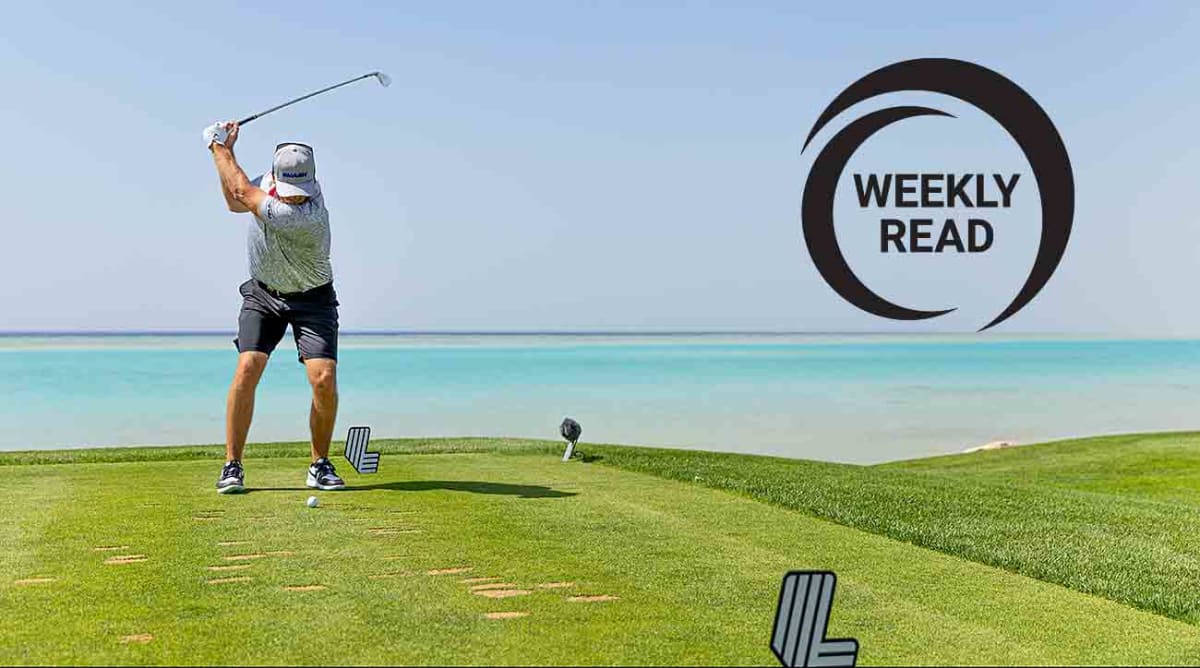More Weekly Read: Tiger's next tournament? | Will there ever be a deal?
Talor Gooch had quite a week—and that was before he hit a shot at the LIV Golf Jeddah event in Saudi Arabia.
Gooch, who won three times last year and was LIV Golf’s player of the year, expressed his frustration over getting no credit for that success as it relates to the Official World Golf Ranking.
That talking point does not seem to be going away, even though the OWGR chairman, Peter Dawson, outlined last October in denying the accreditation bid why LIV Golf League’s format comes up short.
Joaquin Niemann, in the aftermath of his victory on Sunday in Jeddah, brought it up again as he had a few weeks ago when he won in Mexico.

Jon Ferrey/LIV Golf
Others, including LIV Golf’s commissioner, Greg Norman, have pointed out that the OWGR doesn’t include some of the top players because it is not ranking LIV Golf.
Gooch took it farther, suggesting that a Rory McIlroy victory at the Masters would need to come with an “asterisk” because “I think the majors have shown that they are not getting on board with LIV,” he said in an interview with Australian Golf Digest.
“It’s just the reality,” Gooch continued. “I think everybody wins whenever majors figure out a way to get the best players in the world there.”
Gooch was roundly mocked for the asterisk comment—there have been plenty of majors over the years missing some key players, and no victories are discounted—but some of what he and others said was lost.
Without the OWGR accreditation, do the majors need to find other ways to include LIV Golf players? For example, via some sort of separate exemption category?
That argument has been made numerous times as LIV players watch their ranking plummet. And while it might appear to be an easy answer to a problem that even Dawson admitted last year is an issue, it also seems to be a long shot.
First, LIV Golf and those who believe that the majors should just get on board and carve out exemptions for the league miss the very basic issue in play: the OWGR board is made up, in part, of leaders from the four major championships.
Those representatives of the majors are the same folks who denied the OWGR bid based on LIV Golf’s format. So if they believe the format to be flawed, what would compel them to reward that same league with spots using the same format?
Or, we could take this further, especially in the case of the Masters, which will have 13 LIV players in the field, including Niemann, who was given a special exemption two weeks ago by Augusta National.
The Masters has leaned into the PGA Tour and hasn’t wavered much over the years. In 1999, for the first time, it began relying on the OWGR to help fill its field, which for the first time helped expand it beyond just PGA Tour players and without the necessity of special invites.
In 1980, for example, Spain’s Seve Ballesteros only got into the field via a “foreign” exemption even though he had won the British Open the year prior. The wording at the time was that the various exemptions—including the past five years of Open winners—were categories that applied “only to Americans.” Ballesteros otherwise qualified in two ways, but it didn’t matter—he wasn’t American. He won his first Masters that year.
That wording was part of the Masters invitation criteria through Jack Nicklaus’s 1986 win. That year, Greg Norman and Nick Price, the 54-hole co-leaders—Price set the course record with a 63 on Saturday—were in the field due to foreign invites.
In 2000, after going to the OWGR rankings of the top 50 a year earlier, the Masters dropped the PGA Tour “win-and-in” category and instead added the top 40 in the previous year’s money list. It added PGA Tour winners back in 2008 and—in a nod to the newly formed FedEx Cup playoffs—gave those who made the Tour Championship field an invite.
In the intervening years, the Masters has tweaked some of its amateur invites including adding spots for the Asia Pacific Amateur Championship and the Latin America Amateur Championship.
Last year, after giving an exemption to the reigning NCAA individual champion, the Masters announced it would make that an annual invite.
This year, it gave invites to Niemann and two other players who compete primarily on the DP World Tour. To date, the Masters has never given direct spots in the field via the DP World Tour. But it will suddenly start giving them to LIV Golf?
There’s no doubt the game faces a problem if the current situation continues to exist where you’ve otherwise got worthy players competing for a league that doesn’t get points. After next year, for example, Bryson DeChambeau will not be exempt in the majors if something doesn’t change or if he doesn’t have success over the next eight major championships.
Of course there is the argument that “this is the chance they took” when going to LIV Golf, but it doesn’t really satisfy those who want to see the best of the best not only compete more often, but certainly in the game’s biggest events.
Will something change this spring at Augusta National? The Masters typically only announces invitation changes for the following year’s tournament at the chairman’s Wednesday news conference. Perhaps Fred Ridley will come with a surprise. But the club’s history does not suggest as much.







